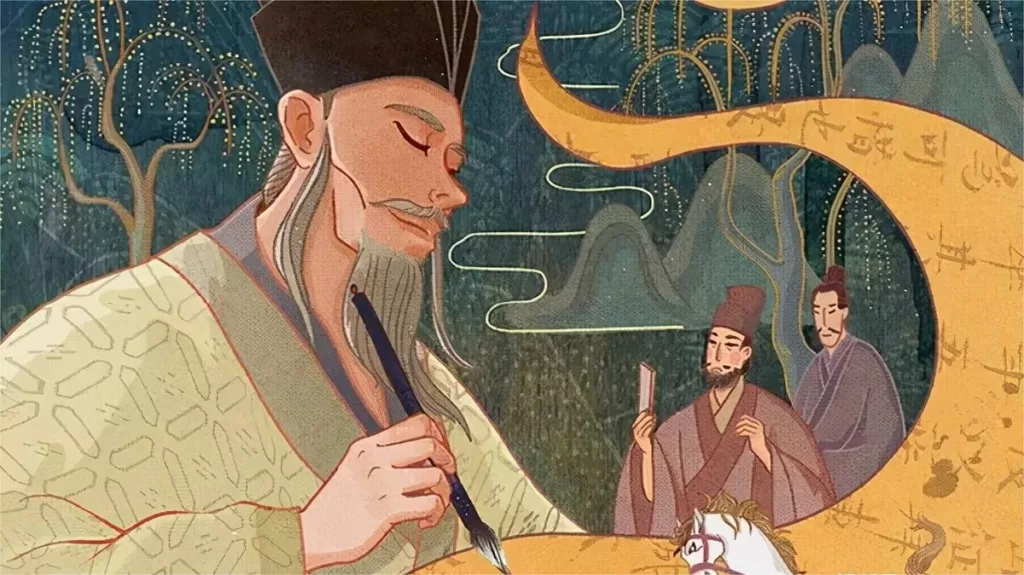OuYang xiu – A Politician, Literary Giant, and historian


Ouyang Xiu (1007 – 1072), courtesy name Yongshu, also known as Zuiweng (the Drunken Sage) and later as Liu Yi Jushi, was a prominent figure in the Northern Song Dynasty of China. Born in Yongfeng, in what is now Yongfeng County, Jiangxi Province, he was a multifaceted talent, serving as a politician, literary giant, and historian.
From a young age, Ouyang Xiu demonstrated a strong passion for learning, even though his family faced financial hardships after the loss of his father when he was just four years old. His dedication to scholarship eventually paid off when he passed the imperial examination and earned the prestigious title of jinshi in the eighth year of the Tian Sheng era under Emperor Renzong of the Song Dynasty, in 1030. This marked the beginning of his illustrious career.
In 1034, during the Jingyou era, he was appointed to the position of a court scribe and later advocated on behalf of the demoted statesman Fan Zhongyan, which led to his own exile to Yiling. However, Ouyang Xiu’s return to the court would come in the following years. He held various official positions, including positions in the Censorate and as a compiler of imperial decrees, actively supporting the Qingli Reforms.
When the Qingli Reforms ultimately failed, he protested against the removal of prominent reformers like Fan Zhongyan and found himself banished to various locations, including Chuzhou, Yangzhou, Yingzhou, and Yingzhou Prefectures. After several years of exile, he was recalled to the capital and appointed as a scholar in the Hanlin Academy.
In 1060, during the fifth year of the Jiayou era, he was promoted to the position of Deputy Chancellor of the Secretariat and then became a Counselor-in-Chief in the following year. However, his tenure in this high office under Emperor Yingzong of the Song Dynasty brought controversy, as he became embroiled in the Puyi Dispute, which subjected him to criticism.
With the ascension of Emperor Shenjong of the Song Dynasty, Ouyang Xiu made efforts to retire from his official duties, serving as an administrator in the provinces of Bozhou, Qingzhou, and Caizhou. He also voiced dissent against some of the measures of the Xining Reforms. In 1071, during the fourth year of the Xining era, he was allowed to retire from his position as the Prince’s Tutor, and he passed away in the following year at the age of sixty-six. He was posthumously honored with the titles of Taishi (Grand Preceptor) and Duke of Chuguo, and he was given the posthumous name “Wenzhong,” often referred to as “Ouyang Wenzhong” by later generations.
Ouyang Xiu was a key figure in the literary revolution of the Northern Song Dynasty, with a penchant for reviving the classical style of Han Yu. He ardently opposed the frivolous literary trends of his time, advocating for a return to classical ideals. His writings earned him a reputation that surpassed many of his contemporaries, placing him among the “Eight Great Prose Masters of the Tang and Song Dynasties” and the “Four Great Masters of Song Dynasty Prose.” His influence extended beyond his own works, as he mentored and guided other prominent literary figures like Zheng Qiao, Wang Anshi, and the father-son duo Su Xun and Su Shi, shaping the literary landscape of the Northern Song Dynasty.
Ouyang Xiu’s prose was known for its clarity and precision, marked by a lyrical style that resonated with readers and effectively conveyed his thoughts and arguments. His poetry was characterized by both strength and elegance, while his ci (a type of Chinese lyric poetry) was celebrated for its graceful and succinct style. Additionally, Ouyang Xiu made significant contributions to fields such as Confucian studies, historiography, and epigraphy. He was a chief editor of the “New Book of Tang” and composed the independent work “New History of the Five Dynasties.”
Today, Ouyang Xiu’s literary legacy endures through his collected poems, essays, and writings, which are cherished by scholars and enthusiasts alike. His profound influence on Chinese literature and culture has earned him a lasting place in the annals of history as a respected statesman and literary luminary.
Chinese officials, Chinese poets, Chinese politicians